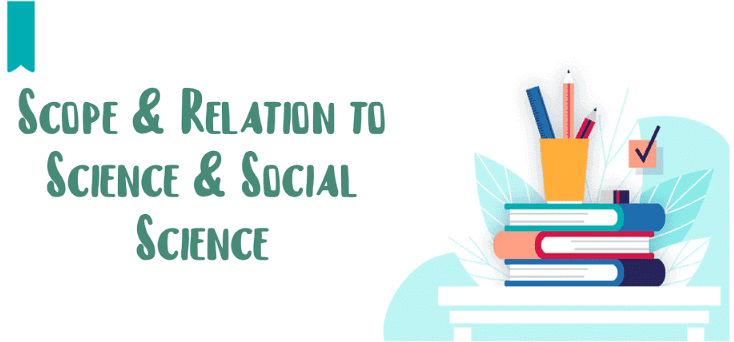Notes: Scope & Relation to Science & Social Science | EVS & Pedagogy Paper 1 for CTET & TET Exams - CTET & State TET PDF Download
Environmental Science helps in maintaining the balance between wildlife sanctuary, forest, biosphere reserve and natural resources. For example:- helps in predicting natural hazards i.e. tsunami, forests fire, earthquake and landslides.

Application of EVS
- Due to industrialization, our environment is degraded on a large scale. So, in order to protect our environment, we need to follow proper rules and regulation being set up by The Environment Protection Act 1986.
- Various research projects are carried out in order to protect the environment. Researches are being done to control pollution to counter global warming, reduction of greenhouse gases and adoption of endless energy source.
- For a healthy and hygienic environment sanitation is vital. So, the study of environmental studies provides us with etiquettes to live healthy lives. For example:- to clean hands before and after having food, proper disposal of wastages.
- EVS let us know about the way to deal under circumstances. For example- massive programmes being carried out in school about things to do if an earthquake occurs in school, Masks to be wear under severe pollution conditions.
Integrated EVS
- As per the guidelines framed by the National Curriculum Framework (2005), “Environmental studies is compulsory to teach up to classes V, for primary classes should be a subject, which combines and circumscribes the concepts and theories from science, social science and environment”.
- EVS books should contain chapters made out of real-life incidents, everyday challenges and present-day issues related to petrol, fuel water, forest, protection of animals, pollution etc. The books of EVS should provide children’s opportunities to debate, engage, and develop a sensitive understanding of these topics.
The syllabus of EVS has been divided into six themes so as to introduce every aspect of learning which are considered important for the child at the primary level.
The six themes are:
- Family and friends (including animals, plants)
- Food
- Water
- Shelter
- Travel
- Things we make and do.
Various activities related to EVS teaching
- Project method
- Source method
- Co-curricular activities
1. Project Method: Under the project, method student is allowed to experience the environment naturally via learning by doing. For example:- giving tasks to children to water the plants and simultaneously let them know about the parts of plants. The emphasis of the project method is on experiential learning, rather than rote learning.
Advantages of project method:
- It helps in developing cultural norms and ethical values among the students.
- It provides a lot of opportunities for the correlation of various elements of the subject matter to the real-life experience. For example- a celebration of festivals, first of all, provide information to students about Diwali festival than organise Diwali Mela to give them exposure to it.
- It helps in the all-round development of students.
Disadvantages of project method:
- The project cannot be planned for all subjects and the whole subject matter cannot be taught by this strategy.
- It is not economical from the point of view of time and cost.
- It is very difficult for a teacher to plan or execute the projects for the learners and supervise them.
2. Source Method: The source method implies the use of original sources and materials while teaching. A source provides first-hand experiences and leads to a better understanding of the subject. The source basically follows the principle of learning by doing, once get real exposure to things to be used to study effectively.
Advantages of source method:
- Source method in the teaching of EVS gives a touch of realism to the subject.
- Source method enhances the curiosity of the children about the question by giving insight into the method of EVS.
Disadvantages of source method:
- Source method is complex and difficult to carry out.
- It requires trained teachers.
- It is very difficult to access the original sources
3. Co-curricular Activities: Co-curricular activity is defined as a set of programme or activities, carried out by the school, to provide students in hand information about curriculum-related learning.
Importance of Co-Curricular Activities:
- Co-Curricular Activities helps in the overall development of the child.
- Co-Curricular Activities develops ethical and cultural values within the child. For example:- helps makes child socialized and develops the feeling of belongingness in them.
- Co-Curricular Activities is basically motivating the child to develop a positive attitude towards life.
- Co-Curricular Activities includes sports, play, dance, drama and singing all these helps in upbringing the hidden talent of the child. For example:- Activities like participation in-game debates, music, drama, etc., help in achieving the overall functioning of education.
|
21 videos|139 docs|35 tests
|
FAQs on Notes: Scope & Relation to Science & Social Science - EVS & Pedagogy Paper 1 for CTET & TET Exams - CTET & State TET
| 1. विज्ञान और सामाजिक विज्ञान केंद्रीय शिक्षक पात्रता परीक्षा (CTET) और राज्य स्तरीय शिक्षक पात्रता परीक्षा (State TET) के लिए क्यों महत्वपूर्ण हैं? |  |
| 2. विज्ञान और सामाजिक विज्ञान के खंड क्या-क्या हैं जिन्हें CTET और State TET में शामिल किया गया है? |  |
| 3. CTET और State TET की तैयारी के लिए विज्ञान और सामाजिक विज्ञान की सबसे अच्छी पुस्तकें कौन-कौन सी हैं? |  |
| 4. विज्ञान और सामाजिक विज्ञान के क्षेत्र क्या-क्या हैं जिन्हें CTET और State TET में पूछा जा सकता है? |  |
| 5. CTET और State TET की परीक्षा में विज्ञान और सामाजिक विज्ञान के प्रश्न कितने प्रकार के होते हैं? |  |
















